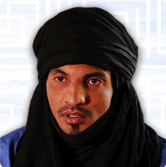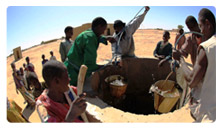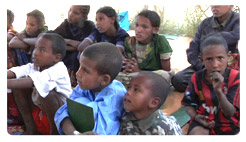This article is also available on the Miami Herald web site.



Ana Veciana-Suarez
February 18, 2011
Two days into their trip to the end of the world, Miami filmmaker Robyn Symon and her crew found themselves in the middle of the Sahara desert, hours from Timbuktu and any meager sign of civilization. The Tuareg chief who was leading them to his tiny village had made it clear their journey would have to wait until the following day. The river was impassable.
“Well, I thought, what do we do?” recalls Symon. “This isn’t on my itinerary. And we can’t very well check into a Holiday Inn.”
Within minutes, a group of Tuareg — descendents of the Berbers, known as the Blue People for their long robes and blue-veiled faces — materialized in the windy darkness, pitched three tents, slaughtered a goat and cooked it over a fire.
It was the first of many adventures for Symon during almost two weeks filming in Mali, a landlocked country in West Africa that is home to many Tuaregs. Tentatively titled Beyond the Blue Veil, her documentary details the hardscrabble life of the Tuareg and their proud fight to maintain their culture and way of life.
A trailer of the film will be shown at a Feb. 26 fundraiser at a Fisher Island home, where the nonprofit Foundation for the Advances of Cultural and Economic Survival (FACES) hopes to raise enough money to build a well and a school for the nomadic people in northern Mali.
 The star of the film is Mamatal Ag Dahmane, 33, a descendant of a Tuareg king and a music producer who will attend the fundraiser. He also was scheduled to speak at St. Thomas University and FIU to draw attention to the plight of his people.
The star of the film is Mamatal Ag Dahmane, 33, a descendant of a Tuareg king and a music producer who will attend the fundraiser. He also was scheduled to speak at St. Thomas University and FIU to draw attention to the plight of his people.
“If nothing is done, I think this culture will simply disappear,” Ag Dahmane told Symon during an interview used in the film.
He explains that Tuareg settlements consist of tents or two or three mud structures. “These people are in extreme poverty, and when you go to the city, you will see some Tuareg who have assimilated.”
With Ag Dahmane as a guide, Symon was given access to a society few foreigners see. The Tuareg people number about 1 million in six countries. For hundreds of years, into the mid-20{+t}{+h} century, they were known as industrious herders. They also controlled trans-Saharan trade, carrying goods across the desert. But as trains and trucks took over those trade routes and drought threatened their livelihood, the Tuareg have found themselves in a fight for survival.
In their heyday, the Tuarag had a thriving civilization and are believed to have the oldest alphabet in continuous use. Today, most cannot read or write, and their infant, child and maternal mortality rates are among the highest in the world.
Symon says the Mali government has been, at best, neglectful. What’s more, U.S. State Department travel warnings – Al Queda operatives, bandits and drug smugglers lurk in the region – have kept away tourists who could be a new source of revenue for a people known for their craftsmanship in jewelry, leather goods and swords.
 Though Symon had read extensively about Mali and the Tuareg, she was not prepared for the beauty – or the poverty – she witnessed. Schools are rare and medical care practically nonexistent. Ag Dahmane’s 12-year-old sister died en route to the closest hospital.
Though Symon had read extensively about Mali and the Tuareg, she was not prepared for the beauty – or the poverty – she witnessed. Schools are rare and medical care practically nonexistent. Ag Dahmane’s 12-year-old sister died en route to the closest hospital.
“We have only the camel to transport her,” he said.
Symon found them “a very gracious people, proud and nonviolent.” But she concedes there were moments when she was frightened.
On the first day in Mali’s capital city of Bamako, the crew was greeted with reports that a grenade had been tossed into the French Embassy. When Ag Dahmane took a Tuareg cameraman trained by Symon’s crew into the northern hinterlands, they were chased by bandits.
There were also many lighthearted moments. The Americans taught their Tuareg hosts several games, including thumb wrestling. Symon, a vegetarian, introduced them to the MREs, ready-to-eat field rations normally used by the military. (“They loved the pad Thai.”) And the film’s photography director, Wes Malkin, showed off his camera equipment, a treat for people so geographically isolated.
Nevertheless, Symon, a two-time Emmy Award winning producer who was no stranger to remote areas, called it “the most challenging project” Symon Productions has ever attempted.
“It wasn’t just the terrain — miles and miles and miles of nothing but desert — but also we had to have instant trust as soon as we stepped off the plane,” she says. “We were going to places foreigners had never been and without speaking the language.”
 Symon, 51 and the mother of a grown son, focuses on socially conscious documentary films. A former TV news reporter in Texas, she has written and produced for PBS, Discovery, The Travel Channel and HGTV. For a documentary on women as political candidates, she interviewed Ingrid Betancourt, the former Colombian presidential candidate, months before she was kidnapped in 2002 by guerillas.
Symon, 51 and the mother of a grown son, focuses on socially conscious documentary films. A former TV news reporter in Texas, she has written and produced for PBS, Discovery, The Travel Channel and HGTV. For a documentary on women as political candidates, she interviewed Ingrid Betancourt, the former Colombian presidential candidate, months before she was kidnapped in 2002 by guerillas.
She became interested in the Tuareg’s plight after her mother, Linda Simon, a Miami psychotherapist, visited Mali with friends in early 2010. She was invited to speak on HIV at a clinic in Mali, where she met Ag Dahmane and learned about the Tuareg. (Symon changed the spelling of her last name in college.)
Mother and daughter realized they wanted to do something, each in her own way. “We have so many laws in place to protect endangered species, but we don’t have anything to protect cultures,” Linda Simon says.
She founded FACES, a nonprofit dedicated to preserving cultures at risk of extinction. The money raised Feb. 26 will go toward the recently established Tidainiwen School, which is educating 87 children living in temporary tents. FACES hopes to fund permanent structures as well as provide clean well water.
The second part of the FACES projects is the documentary, which the two women hope will increase awareness about the losses facing the Tuaregs.
“The world and we as individuals have an obligation to know what cultures are at risk and try to help them,” Robyn Symon says. “We can participate in a developing world, but we can also preserve and honor ancient cultures. We can certainly do both.”
FACES is committed to facing the challenges ot those who need a hand,
a voice and a face in the world
FACES is a 501 (c)3 Corporation
Privacy Policy